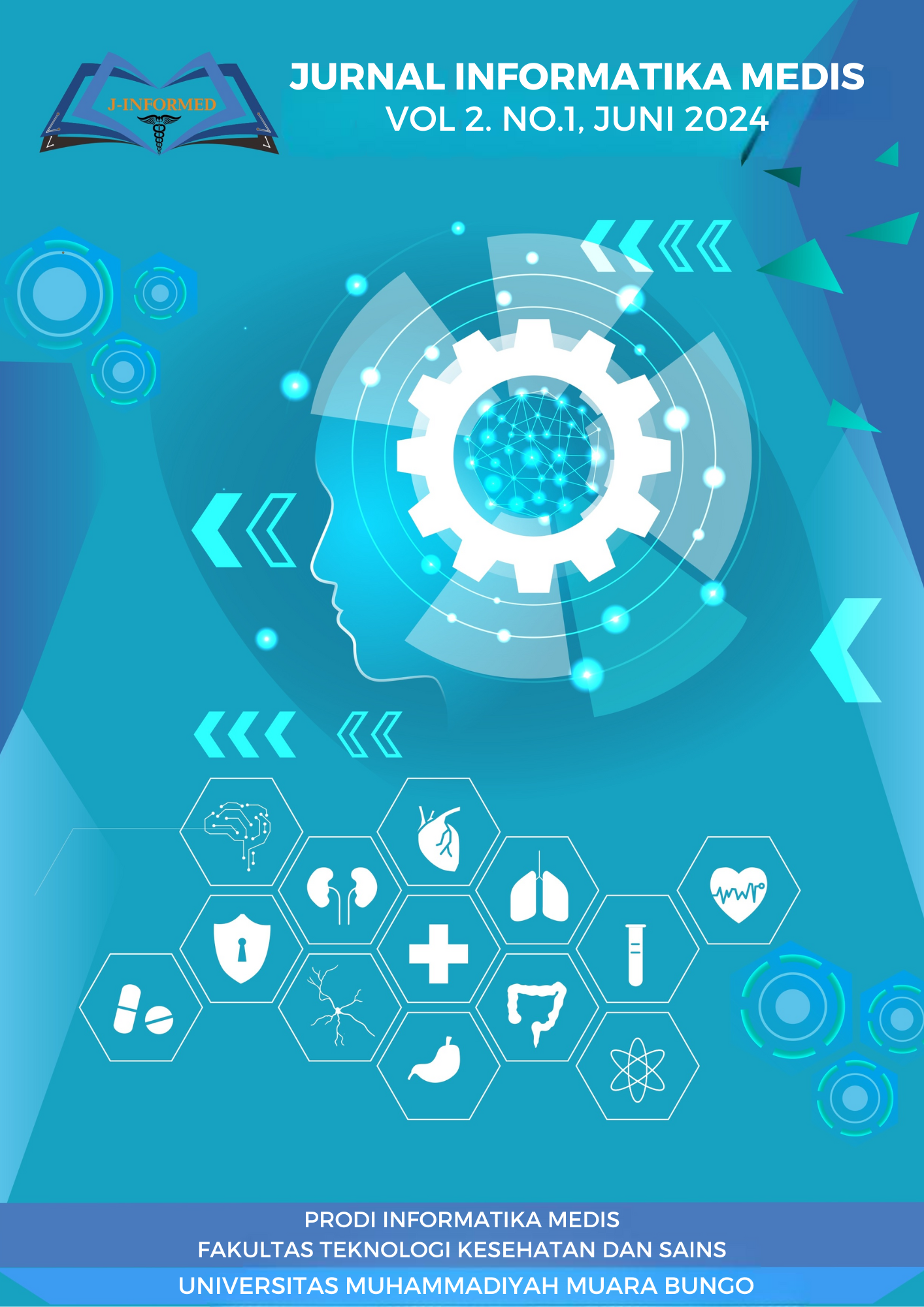METODE RANDOM FOREST UNTUK MEMUDAHKAN KLASIFIKASI DIAGNOSIS PENYAKIT MENTAL
Abstract
Mental health is important in the development of every individual. A bad mentality can prevent a person from developing, making a person easily stressed, hopeless, and even attempt suicide and commit crimes. Currently there are quite a lot of case related to mental health which are caused by many factors such as economic, social and medical. Reflecting on this fact, there is a need for rapid mental health detection so that immediate intervention can be carried out. This needs to be done so that the patient's condition can improve. This research focuses on diagnosing mental illness by utilizing machine learning. The method used is random forest which in several studies has been proven to produce good accuracy. Random forest performs machine learning on the attributes contained in the dataset combined with K-Fold Cross Validation so that each patient can be evaluated. Next, a tuning process is also carried out to test the parameters contained in the method. After the tuning process was carried out, the best parameters obtained were n-estimator of 30, maximum depth of 4, minimum sample leaf of 2, and minimum sample split of 10. From the combination of these parameters, accuracy is 90.83%, recall is 90.83 %, and precision of 93.25%.
References
A. RAHIM, A.M., INGGRID YANUAR RISCA PRATIWI AND MUHAMMAD AINUL FIKRI (2023) ‘Klasifikasi Penyakit Jantung Menggunakan Metode Synthetic Minority Over-Sampling Technique Dan Random Forest Clasifier’, Indonesian Journal of Computer Science, 12(5), pp. 2995–3011. Available at: https://doi.org/10.33022/ijcs.v12i5.3413.
HENDERI, H. (2021) ‘Comparison of Min-Max normalization and Z-Score Normalization in the K-nearest neighbor (kNN) Algorithm to Test the Accuracy of Types of Breast Cancer’, IJIIS: International Journal of Informatics and Information Systems, 4(1), pp. 13–20. Available at: https://doi.org/10.47738/ijiis.v4i1.73.
HIDAYAT, N.A. AND MIRZA, A. (2023) ‘Sistem Pakar Screening Awal Gangguan Kesehatan Mental Social Anxiety Disorder Menggunakan Metode Forward Chaining Berbasis Website’, Biner : Jurnal Ilmu Komputer , Teknik dan Multimedia, Volume 1,(3), pp. 1–15. Available at: https://journal.mediapublikasi.id/index.php/Biner
KINAURA, N.P. AND KALIFIA, A.D. (2024) ‘Gudang Jurnal Multidisiplin Ilmu Dukungan Sosial Dan Penanganan Stres Dalam Konteks Kesehatan Mental’, Gudang Jurnal Multidisiplin Ilmu, 2, pp. 330–332.
MAULANA, M.I. et al. (2023) ‘Upaya Penanganan Dan Peningkatan Kesehatan Mental’, KOLONI, 2(4), pp. 90–98.
NURHAFIYAH, I. AND MARCOS, H. (2023) ‘Sistem Pakar Diagnosis Kesehatan Mental Pada Mahasiswa Universitas Amikom Purwokerto’, Komputa : Jurnal Ilmiah Komputer dan Informatika, 12(1), pp. 49–56. Available at: https://doi.org/10.34010/komputa.v12i1.8978.
RIJAL, M., AZIZ, F. AND ABASA, S. (2024) ‘Prediksi Depresi : Inovasi Terkini Dalam Kesehatan Mental Melalui Metode Machine Learning Depression Prediction : Recent Innovations in Mental Health Journal Pharmacy and Application’, Journal Pharmacy and Application of Computer Sciences, 2(1), pp. 9–14. Available at: https://doi.org/10.59823/jopacs.v2i1.47.
SINAGA, A. AND NURAISANA, N. (2021) ‘Implementasi Algoritma Brute Force Dalam Pencarian Menu Pada Aplikasi Pemesanan Coffee ( Studi Kasus : Tanamera Coffee )’, Jurnal Ilmu Komputer dan Sistem Informasi, 3(3), pp. 303–313.
SURYADI, M.K. et al. (2024) ‘A Comparative Study of Various Hyperparameter Tuning on Random Forest Classification with SMOTE and Feature Selection Using Genetic Algorithm in Software Defect Prediction’, Journal of Electronics, Electromedical Engineering, and Medical Informatics, 6(2), pp. 137–147. Available at: https://doi.org/10.35882/jeeemi.v6i2.375.
TEMBUSAI, Z.R., MAWENGKANG, H. AND ZARLIS, M. (2021) ‘K-Nearest Neighbor with K-Fold Cross Validation and Analytic Hierarchy Process on Data Classification’, International Journal of Advances in Data and Information Systems, 2(1), pp. 1–8. Available at: https://doi.org/10.25008/ijadis.v2i1.1204.

| Keywords | : |
Keywords:
mental health, random forest, machine learning, classification
|
| Galleys | : | |
| Published | : |
2024-06-25
|
| How to Cite | : |
Priyono, A., Shodiq, M., Alvinsyah, D. P., & Hidayah, S. A. (2024). METODE RANDOM FOREST UNTUK MEMUDAHKAN KLASIFIKASI DIAGNOSIS PENYAKIT MENTAL . Jurnal Informatika Medis, 2(1), 1–4. https://doi.org/10.52060/im.v2i1.2119
|
| Issue | : |
Section
Articles
|







